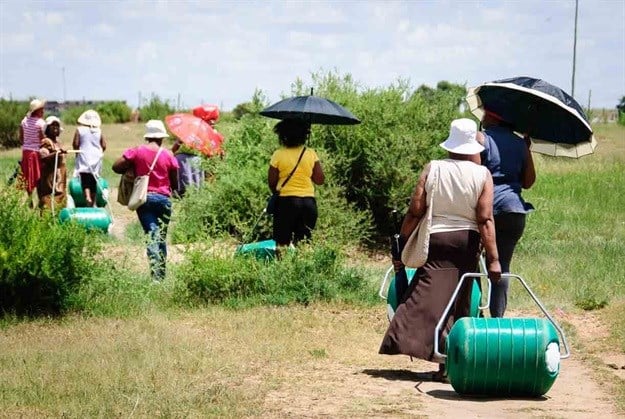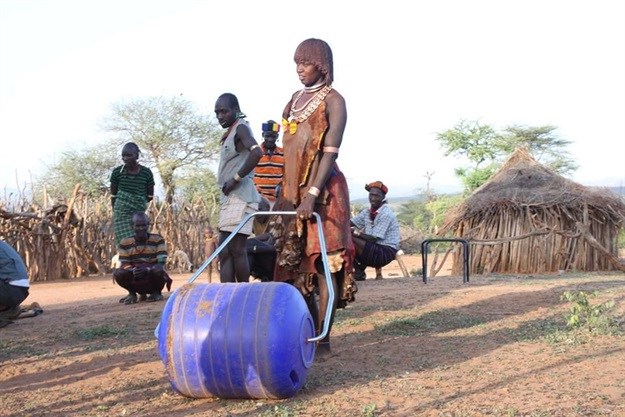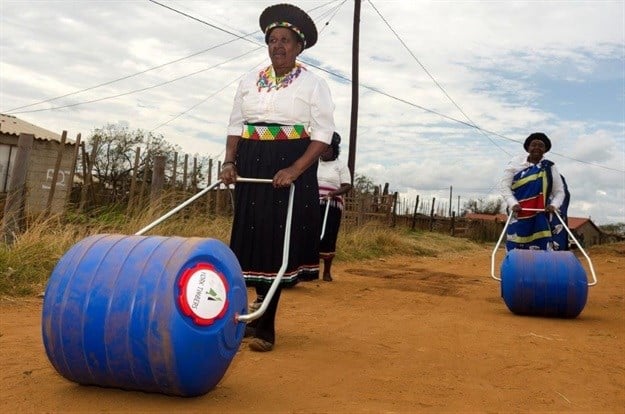
Grant Gibbs, executive director, Hippo Roller
We interviewed Grant Gibbs, executive director of Hippo Roller, to find out more about the inspiration behind the invention, what sort of reach it has, and the extent of its social impact.
What inspired the idea to launch the Hippo Roller?
The Hippo Roller was conceptualised in 1991 by Pettie Petzer and Johan Jonker, two South Africans who grew up on farms, experiencing the national water crisis first-hand and witnessing local communities carrying heavy buckets of water on their heads for kilometres every day.
With roots in these water-dependent, resource poor environments, JP and Pettie were familiar with the struggle to access water that millions of Africans experience daily. In particular, JP noticed that workers on his father’s farm were collecting empty 20-litre plastic containers so that they could use them to fetch their own water. These containers are typically of poor quality and not very durable. He thought there had to be a better way.
As co-inventor Pettie describes it, the original idea was based on a wheelbarrow including a moulded tank for a low centre of gravity, and in trying to get their concept going, one of the first problems they encountered was the price of the wheel itself. It was the most expensive component. And it was about then that Pettie had his eureka moment: “Let’s put the water inside the wheel!”
And so the Hippo Water Roller was born. Initially branded the “Aqua Roller”, it received its first design award in 1992.
How has the Hippo Roller evolved over the last 20 years?
There have been relatively few changes to the original design of the Hippo Roller, a testament to its simplicity and practicality. It remains a technology absolutely relevant to the needs of the communities it serves. That said, one of the biggest obstacles to distributing these life-changing devices more broadly has been its price tag, and shipping volume.
Some years ago, we went back to the drawing board, using the pro-bono skills and resources of Engineers Without Borders, to create a new design on the same principles, one that would be easier to transport. Two teams worked on the project: one focused on reducing cost in any way, and one focused on playing with the inherent design of the device. Whilst a few solutions were proffered, none really improved on the original design, which is still in use today, 25 years after its inception.
Still, we have introduced some minor improvements and have added some optional extras including the “Utility/Irrigation Cap” for small-scale farmers and the “Hippo Spaza” for the more entrepreneurial informal traders.
What sort of reach does the Hippo Roller have?
More than 55,000 Hippo Rollers have been distributed in more than 29 countries to date, changing the lives of millions of people. But this is just the beginning. Projects supporting small-scale farmers across the continent would impact millions more, with hundreds of thousands of small-scale farmers participating in initiatives aimed at moving them from subsistence to sustainable commercial “agripreneurs”.
What is the broader social impact of the Hippo Roller?
With hundreds of millions of women and children struggling daily for access to water, the Hippo Roller makes an immediate, and profound impact, significantly improving their ability to collect more water, more efficiently, and empowering them to spend more time on education and other important tasks in the home, and community.
Interestingly, whilst access to water remains our greatest challenge, time remains our most precious resource. Put simply, by addressing the difficulty of retrieving water, the Hippo Roller buys more time! This ‘time’ in turn can be put to more productive use for education, health, community development, and food security. Better health and education give people a measure of independence and skills that allow them to take advantage of potential economic opportunities.
In short, the impact the Hippo Roller brings to the community includes:
- time savings;
- reduced strain and effort for that “last mile” haulage;
- flexible infrastructure to access multiple water points (seasonal);
- increased water availability, with benefits for health and food security;
- hygienic water storage in the home;
- improved economic prospects (commercial farming for example).
The Hippo Roller is instantly understood and accepted as a far better option for retrieving water, requiring very little explanation or demonstration. The net result? People begin to enjoy the benefits immediately.
And its impact has been profound. Women, children and the elderly are now able to transport 90 litres (90kg) of water easily, to provide enough for a family of five people for a day, with a single trip. It also appears that the male fascination with gadgets is universal. Some men have taken over water fetching duties from their wives because they are proud to be seen using the Hippo Roller.
Nonetheless, our experience has been that it remains important for the community leaders and the community itself to be fully consulted and engaged in the process of introducing the Hippo Roller. There are seldom enough to go around in any given community, and so they are diligently allocated and distributed to the neediest first (women, child-headed homes, the elderly or infirm) by the local community leaders.
We have discovered that a Hippo Roller is never idle. Often it is shared widely, and works hard, each Hippo Roller potentially meeting the needs of dozens of people. In a recent project in Mozambique, for example, 30 Hippo Rollers are serving the needs of nearly 4,000 people. This Hippo Roller illustrates perfectly how a product that benefits a developing country requires compatibility with the local environment and cultural standards.
Why do you believe the Hippo Roller makes for good CSI?
CSI encompasses projects that are external to the normal business activities of a company and not directly for purposes of increasing company profit. These projects have a strong developmental approach and utilise company resources to benefit and uplift communities and are not primarily driven as marketing initiatives.
That said, there are a number of specific trends to watch out for in the overall CSR space. Forbes covers these in more detail ("6 CSR trends to watch in 2017").
But there’s one underlying catalyst for these trends, and that is a near universal commitment to the global sustainability agenda where, on September 25th 2015, the world adopted a set of goals to end poverty, protect the planet, and ensure prosperity for all as part of a new sustainable development agenda. Each goal has specific targets to be achieved over the next 15 years. And for the goals to be reached, everyone needs to do their part: governments, the private sector, civil society.
Water is one of these specific goals (access to water and sanitation for all) and the Hippo Roller is an effective and appropriate solution to achieving it.
What other African social innovations do you find inspiring?
Little Sun’s premium solar products and its social business model which benefit communities without electricity worldwide is a fantastic initiative. Founded in 2012 by artist Olafur Eliasson and engineer Frederik Ottesen, Little Sun believes in the power of sustainable light and energy to transform lives. The business seeks to strengthen communities from the inside by creating local jobs and generating local profits through its local partners and network of young, African entrepreneurs.
Little Suns are sold at a higher price in areas of the world with electricity so that its products can be sold in off-grid areas at much lower, locally affordable prices.
Another inspiring innovation is the ‘Pure Water’ project, conceptualised in collaboration with Engineers without Borders, Reignite Action for Development and Cameroon’s Bambui Water Authority. The original aim of the project was to create an improved water purification system for Bambui, Cameroon. The focus of the improvements was creating a chemical-free disinfection process as chemical methods are non-renewable, costly and potentially dangerous. This led the design and development of an environmentally friendly process that can disinfect water using sunlight.
Water and light. Simple ideas. Changing lives.
Are there any expansion plans for the social enterprise you'd like to share with us?
We have set up a Hippo Roller Inc. presence in the US, and have a measure of representation in North America, Europe and Australia. Ideally, we would like to set up local manufacturing facilities closer to the countries most in need, as shipping remains the single most costly element of distribution. We have also investigated the potential of setting up solar-powered rotational moulding manufacturing (zero carbon footprint) plants to cater for manufacturing opportunities closer to the points of demand.
But our primary focus is on partnering appropriately with major corporates, NGOs and government bodies actively targeting sustainable solutions to water access challenges.
We believe that there is massive scope for micro-financing services to include the Hippo Roller as a 'product with purpose' and to broaden the business model of Hippo Roller to make it less dependent on conventional fundraising and donor generosity.
We also think that the world of NGOs and philanthropy will be disrupted by web and/or mobile-based innovation, in exactly the same way that Uber, AirBnb, Amazon, Facebook, Netflix, Apple, Google and others have turned conventional industries upside down. And so we’ll be keeping an eye on how these might impact on the sustainability of Hippo Roller.
And on that note (sustainability), we expect Hippo Roller’s business model to scale by an order of magnitude in the coming years. It was just last year that Hippo Roller was the recipient of the Frost & Sullivan 2016 African Rural Portable Water Solutions Product Leadership Award, which summarised its own view of our future, like this:
“Since the establishment of the Hippo Water Roller Project in 1994, the company has continued to provide an appropriate portable water solution for economically poor communities across Africa. Leveraging its relationships with sponsors, corporate partners, and NGOs, the Hippo Water Roller Project has established itself as a sustainable initiative that provides African communities with an immediate and winning water and sanitation solution.”
One thing we do know is that the problem of water security is not going away!









































